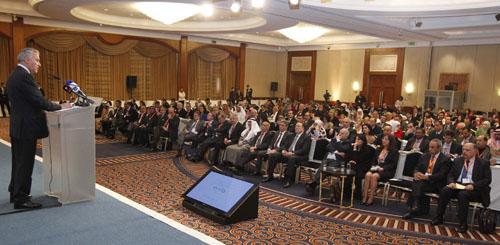You are here
Achieving food self-sufficiency requires serious regional cooperation — Shakhshir
By Hana Namrouqa - Nov 26,2014 - Last updated at Nov 26,2014

AMMAN — Achieving food security is exceptionally important for Arab countries because they suffer from water scarcity, limited agricultural lands, increasing population growth, depletion of natural resources, climate change, and political and economic instability, Environment Minister Taher Shakhshir said on Wednesday.
“Achieving food self-sufficiency in the Arab region requires focusing on serious regional cooperation based on the huge disparity between Arab countries in ecosystems and natural resources as well as income and consumption patterns,” added Shakhshir, who was deputising for His Majesty King Abdullah at the opening of the Arab Forum for Environment and Development’s (AFED) Seventh Annual Conference.
The minister underscored that global projections predict an upward trend in food prices and negative repercussions on food security in the region due to the impact of climate change.
He called on Arab countries to integrate climate change adaptation measures in their water and agriculture strategies, reduce energy use and shift to low water consumption crops.
Shakhshir highlighted that cooperation among regional countries paves the way for reducing the Arab world’s dependence on imports of basic commodities, especially grain.
Cereals constitute 63 per cent of Arab countries’ food imports, according to the AFED’s 2014 annual report on “Food Security in Arab Countries” that was released on Wednesday.
Noting that “loss in imported wheat in some Arab countries translates to about 3.3 million tonnes due to inefficient import logistics,” the report said the combined value of grain post-harvest losses and wheat import losses amounted to about $3.7 billion at 2011 import prices, which represents 40 per cent of the wheat produced in all Arab countries in value terms and is equivalent to about four months’ worth of wheat imports.
Food imports of Arab countries amounted to $56 billion in 2011, with the figure expected to reach $150 billion in 2050, the report said, proposing a number of options that can enhance food self-sufficiency in the Arab world.
The report cited the main causes of post-harvest losses as improper methods used in the harvesting, processing, transportation and storage of crops, as well as inefficient import supply chain logistics.
Arab countries have considerable livestock and fishery resources and are almost self-sufficient in fish, “but about 25 per cent of meat demand is being met through imports,” and this percentage is expected to increase in the future “driven by population, wealth and urban growth”, the report noted.
Suggesting that Arab countries develop their livestock and fisheries, the report highlighted that the fisheries sector has great potential not only to meet domestic demand, but also for exporting.
“Fish is not a less important source of protein intake than meat. Consuming fish should be encouraged to reduce excessive consumption of meat for economic and health reasons, as well as considering the impact of livestock production on the scarce water resources and the environment,” the report said.
It also called for an awareness campaign to encourage consumers to adapt their food consumption habits towards healthier patterns, and more conducive to the sustainability of agricultural resources.
In addition, the report proposed improving irrigation efficiency, as average irrigation efficiency in 19 Arab countries is below 46 per cent.
“It is estimated that raising this figure to 70 per cent would save about 50 billion cubic metres of water annually.”
Among the options for Arab states to enhance food self-sufficiency is improving water productivity and reuse by applying improved agricultural practices such as modern irrigation methods, improved drainage, conservation agriculture, optimal fertiliser use, innovative crop protection techniques and effective extension services, according to the report.
“In addition, water productivity can be further improved by shifting consumption habits towards less water-intensive crops of similar nutritional value.”
Related Articles
The Arab region, which imports about half of its food needs, can boost its food production primarily by improving productivity and irrigation efficiency, in addition to regional cooperation, according to a report that will be launched in Amman on Wednesday.
AMMAN — Food production in Jordan has increased by 23.8 per cent over the past decade (2013-2022), according to data from the Food Budget Su
AMMAN — The National Centre for Agricultural Research (NARC) organised a workshop on Monday titled “The Use of Nuclear and Biological Techno
















